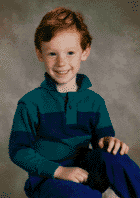Excerpt from Children's Past Lives

Chapter 1: Chase and Sarah
"Sit on your Mom’s lap, close your eyes, and tell me what you see when you hear the loud noises that scare you," Norman gently instructed Chase.
I looked down at Chase’s freckled face. Nothing could have prepared me for what I was about to hear.
Young Chase immediately began describing himself as a soldier—an adult soldier—carrying a gun. "I’m standing behind a rock. I’m carrying a long gun with a kind of sword at the end." My heart was pounding in my ears and the hair on my arms stood up as I listened. Sarah and I glanced at each other in wide-eyed amazement.
"What are you wearing?" Norman questioned.
"I have dirty, ripped clothes, brown boots, a belt. I’m hiding behind a rock, crouching on my knees and shooting at the enemy. I’m at the edge of a valley. The battle is going on all around me."
I listened to Chase, surprised to hear him talk about war. He had never been interested in war toys, and had never even owned a toy gun. He always preferred games and construction toys; he would spend hours at a time happily building with blocks, Legos and his wooden trains. His television watching was strictly limited to Sesame Street and Mr. Rogers, and none of the Disney movies he had seen depicted war.
"I’m behind a rock," he said again. "I don’t want to look, but I have to when I shoot. Smoke and flashes everywhere. And loud noises: yelling, screaming, loud booms. I’m not sure who I’m shooting at—there’s so much smoke, so much going on. I’m scared. I shoot at anything that moves. I really don’t want to be here and shoot other people."
Go to Civil War Drawings to see other drawings Chase did after the regression.
Although this was Chase’s little-boy voice, his tone was serious and mature—uncharacteristic of my happy five-year-old. He actually seemed to be feeling this soldier’s feelings and thinking his thoughts. He really didn’t want to be there shooting at other men. This was not a glorified picture of war or soldiering; Chase was describing the sentiments of a man in the heat of battle who had serious doubts about the value of his actions, was terrified, thinking only of staying alive. These feelings and images were coming from some place deep within him. Chase was not making this up.
Chase’s body, too, revealed how deeply he was experiencing this life. As he described himself shooting from behind the rock, I could feel his body tense on my lap. When he admitted he didn’t want to be there and shoot at other people, his breathing quickened and he curled up into a ball, as if he were trying to hide and avoid what he saw. Holding him, I could feel his fear.
Norman sensed Chase’s distress with his role as a soldier who, in order to survive, had to kill other men. He explained to Chase, talking slowly, "We live many different lives on Earth. We take turns playing different parts, like actors in a play. We learn what it means to be human by playing these different parts. Sometimes we are soldiers and kill others in a battle, and sometimes we are killed. We are simply playing our parts to learn." Using simple language, Norman emphasized to Chase that there was no blame in being a soldier. He assured Chase that he was just doing his job, even if he had to kill other soldiers in battle.
As he listened to Norman’s assurances, I could feel my son's body relax and his breathing become more regular. The anguished look on his face melted away. Norman’s words were helping. Chase was actually understanding and responding to these universal concepts.
